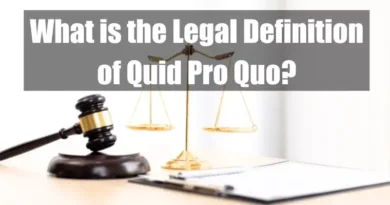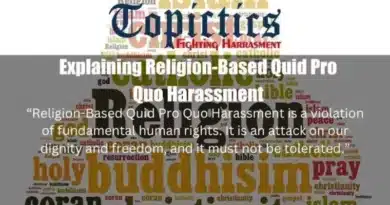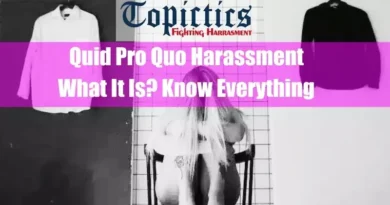Quid Pro Quo Meaning in Politics
In politics, “quid pro quo” refers to an exchange where one party provides a favor or advantage to another, expecting something of equal value in return. This can involve trading goods, services, or favors, such as legislative support, political endorsements, or financial contributions. While some exchanges are legal and transparent, others may cross into unethical or illegal territory, resembling bribery or corruption. The legality and ethics of such arrangements depend on factors like transparency, the nature of the exchange, and adherence to laws governing political conduct.
Key Points
| Key Points |
|---|
| Quid pro quo in politics refers to an exchange where one party offers a favor or advantage expecting something of equal value in return, influencing decision-making processes and the integrity of public office. |
| While legal exchanges, such as mutual legislative support, can facilitate governance when transparent, unethical or illegal arrangements involving bribery—such as financial contributions for policy favors—undermine public trust. |
| Historical cases like the “Corrupt Bargain” of 1824 and the 1974 Milk Case highlight how quid pro quo scandals impact political careers, erode public confidence, and disrupt policymaking. |
| Various laws, including the U.S. Bribery Statute (18 U.S.C. § 201) and the Honest Services Fraud Statute (18 U.S.C. § 1346), regulate quid pro quo practices, distinguishing lawful negotiations from corruption based on intent, explicitness, and timing. |
| Consequences of illegal quid pro quo include criminal penalties, loss of office, and reputational damage, underscoring the importance of transparency and ethical governance in political exchanges. |
Introduction
“Quid pro quo,” a Latin term meaning “something for something,” refers to an exchange where one party provides a favor or advantage to another, expecting to receive something of equal value in return. In politics, this concept is significant as it can influence decision-making processes and the integrity of public office. While some quid pro quo arrangements are legal and part of routine political negotiations, others may cross ethical or legal boundaries, leading to allegations of corruption.
Understanding Quid Pro Quo in Politics
Basic Concept: Exchange of Favors or Advantages
In the political realm, quid pro quo involves reciprocal arrangements where politicians or public officials exchange favors, services, or benefits. For example, a legislator might support a colleague’s bill in return for future support on their own legislation. Such exchanges are commonplace and can facilitate legislative processes when conducted transparently and within legal boundaries.
Distinction Between Legal and Illegal Exchanges
Not all quid pro quo arrangements are unlawful. Legal exchanges typically involve transparent agreements that do not compromise the public interest or violate ethical standards. However, when an exchange involves bribery—such as offering money or gifts to a public official in return for favorable treatment—it becomes illegal. The key distinction lies in whether the exchange serves the public good and adheres to legal and ethical guidelines or undermines public trust and violates the law.
Examples of Common Political Quid Pro Quo Scenarios

Common scenarios include:
- Legislative Support: A lawmaker agrees to back another’s bill with the understanding that their own bill will receive support in the future.
- Political Appointments: An official appoints an individual to a governmental position in exchange for political support or campaign contributions.
- Policy Favors: A business entity donates to a politician’s campaign expecting favorable legislation or regulatory decisions in return.
While some of these practices are legal, they can raise ethical concerns, especially if they prioritize private interests over the public good.
Historical Instances of Quid Pro Quo in Politics
Notable Cases from the Past
The “Corrupt Bargain” of 1824:
In the U.S. presidential election of 1824, none of the candidates secured a majority in the Electoral College, sending the decision to the House of Representatives. Speaker of the House Henry Clay allegedly influenced the House to elect John Quincy Adams, who subsequently appointed Clay as Secretary of State. This arrangement was denounced by Andrew Jackson’s supporters as a “corrupt bargain,” suggesting a quid pro quo that undermined democratic principles.
The Milk Case of 1974:
This scandal involved the Nixon administration’s alleged acceptance of campaign contributions from dairy producers in exchange for increasing federal milk price support. Investigations revealed that the Associated Milk Producers Inc. pledged significant financial contributions to Nixon’s campaign, leading to suspicions of a quid pro quo arrangement. Although key figures were indicted, including former Treasury Secretary John Connally, he was ultimately acquitted due to insufficient evidence.
Impact on Political Careers and Public Trust
Such instances of alleged quid pro quo have had profound effects on political careers and public trust:
- Erosion of Public Trust: Revelations of quid pro quo arrangements, especially those bordering on or constituting corruption, can lead to public cynicism and decreased trust in governmental institutions.
- Career Consequences: Politicians implicated in unethical quid pro quo dealings may face legal repercussions, loss of office, or damage to their reputations, hindering future career prospects.
- Policy Implications: Such scandals can stall legislative agendas and shift focus from governance to legal battles, impeding effective policy-making.
Understanding these historical instances underscores the importance of transparency and ethical conduct in politics to maintain public trust and ensure that governmental actions serve the collective interest rather than individual gains.
Legal Framework Surrounding Quid Pro Quo
Relevant Laws and Regulations
Quid pro quo arrangements in politics are governed by various laws designed to prevent corruption and maintain public trust. In the United States, key statutes include:
The Bribery Statute (18 U.S.C. § 201):
This federal law criminalizes the act of offering, giving, receiving, or soliciting anything of value with the intent to influence an official act. It specifically addresses quid pro quo arrangements where a public official’s actions are exchanged for gifts or favors.
The Honest Services Fraud Statute (18 U.S.C. § 1346):
This statute targets schemes that deprive others of the intangible right to honest services, often used in cases where public officials exploit their positions for personal gain through undisclosed quid pro quo arrangements.
Criteria Distinguishing Lawful from Unlawful Practices

Determining the legality of a quid pro quo arrangement hinges on several factors:
- Intent: A critical element is the intent behind the exchange. If the intent is to influence an official act in return for something of value, it constitutes bribery.
- Explicitness of the Agreement: An explicit agreement is not always necessary for a quid pro quo to be deemed illegal. Courts may infer intent from the circumstances surrounding the exchange.
- Timing and Context: The proximity in timing between the exchange of value and the official act, as well as the context, can indicate an unlawful quid pro quo.
Consequences of Illegal Quid Pro Quo Arrangements
Engaging in illegal quid pro quo arrangements can lead to severe consequences:
- Criminal Penalties: Convictions can result in imprisonment, fines, and probation. For example, bribery under federal law can carry significant prison terms.
- Loss of Position: Public officials found guilty may be removed from office and barred from holding future public positions.
- Reputational Damage: Individuals involved in such scandals often suffer long-term damage to their personal and professional reputations.
Ethical Considerations
Moral Implications of Quid Pro Quo in Governance
Quid pro quo arrangements in politics raise significant ethical concerns:
- Erosion of Public Trust: When officials engage in exchanges that prioritize personal or special interests over the public good, it undermines citizens’ trust in government institutions.
- Inequitable Influence: Such practices can lead to unequal access to decision-makers, where only those with resources can secure favorable outcomes, marginalizing less privileged groups.
Debate Over Acceptable Political Exchanges
Not all exchanges are inherently unethical. The debate centers on:
- Transparency: Openly disclosed interactions, such as lobbying activities, are generally considered more acceptable than secretive dealings.
- Intent and Outcome: Exchanges aimed at genuine policy advancement, without personal gain, are viewed more favorably.
Impact on Democratic Principles and Public Perception
Unethical quid pro quo practices can have detrimental effects on democracy:
- Policy Distortion: Decisions driven by personal gain rather than public interest can lead to policies that do not reflect the will or needs of the populace.
- Civic Disengagement: Perceptions of widespread corruption can lead to apathy and reduced citizen participation in the democratic process.
Recent Examples and Case Studies
Case Study 1: Mayor Eric Adams’ Alleged Quid Pro Quo
New York City Mayor Eric Adams has faced allegations of engaging in quid pro quo arrangements. Reports suggest that Adams accepted lavish travel gifts from foreign entities, raising concerns about potential influence on his official duties. These allegations have led to a federal corruption case, significantly impacting his political career and re-election prospects.
Case Study 2: Former Illinois House Speaker Michael Madigan
Michael Madigan, who served as Illinois House Speaker for decades, was indicted on multiple counts, including bribery and racketeering. The charges alleged that Madigan used his political position to solicit personal benefits in exchange for legislative favors. Wiretap evidence played a crucial role in the prosecution’s case, capturing conversations that suggested quid pro quo arrangements. In February 2025, Madigan was found guilty of bribery and wire fraud, although the jury was deadlocked on other charges, including racketeering.
These cases underscore the ongoing challenges in distinguishing between lawful political negotiations and unethical quid pro quo arrangements, highlighting the importance of legal frameworks and ethical standards in maintaining public trust.
The Role of Media and Public Opinion
Media’s Influence in Uncovering and Reporting Quid Pro Quo Cases
Investigative journalism plays a pivotal role in exposing political corruption, including quid pro quo arrangements. By scrutinizing the actions of public officials and disseminating their findings, journalists bring unethical practices to light, fostering transparency and accountability. For instance, the Organisation for Economic Co-operation and Development (OECD) highlights the media’s critical role in fighting against impunity by exposing corruption to public scrutiny.
Effect of Public Opinion on Political Accountability
Public opinion significantly influences political accountability. When the electorate becomes aware of unethical behaviors through media reports, it can lead to increased pressure on officials to resign, implement reforms, or face legal consequences. This societal response underscores the importance of an informed citizenry in upholding democratic principles.
Case Studies of Media-Led Investigations
The Bibi Files:
A documentary titled “The Bibi Files” showcased Israeli Prime Minister Benjamin Netanyahu’s police interrogations over corruption charges, intertwined with interviews alleging that the Netanyahus demanded luxury gifts. Despite being banned in Israel due to privacy laws, the film was pirated and widely shared, highlighting the media’s role in bringing such issues to public attention.
Washington Post Editorial Controversy:
Former Washington Post editor Robert Kagan accused owner Jeff Bezos of colluding with Donald Trump to prevent the newspaper from endorsing Kamala Harris for president, suggesting a quid pro quo arrangement. This incident underscores the media’s internal challenges in maintaining editorial independence while exposing potential unethical practices.
Preventive Measures and Reforms
Strategies to Reduce Unethical Quid Pro Quo Practices
Implementing comprehensive ethics training programs for public officials can heighten awareness of ethical standards and the consequences of unethical behavior. Additionally, fostering a culture that encourages the reporting of unethical actions without fear of retaliation is crucial.
Policy Reforms and Legislative Measures
Enacting stringent laws that clearly define and penalize unethical quid pro quo arrangements is essential. Establishing independent oversight bodies with the authority to investigate and prosecute corruption can deter potential offenders. For example, the implementation of the four-eyes principle, requiring dual approval for transactions, aims to reduce unethical behavior, though its effectiveness may vary.
Role of Watchdog Organizations and Public Oversight
Non-governmental organizations (NGOs) and civil society groups serve as watchdogs, monitoring government activities and advocating for transparency. Public oversight, facilitated through freedom of information laws and public participation in governance, ensures that officials remain accountable to the people they serve.
Conclusion
Quid pro quo arrangements in politics, when unethical or illegal, pose significant threats to democratic integrity and public trust. The media’s role in uncovering such practices, combined with an informed and vigilant public, is vital in holding officials accountable. Implementing preventive measures, including robust policy reforms and active engagement of watchdog organizations, is essential to mitigate unethical behaviors. Collectively, these efforts contribute to a more transparent and accountable political system, reinforcing the foundational principles of democracy.









